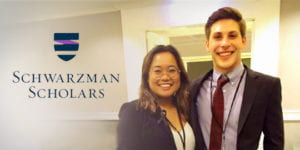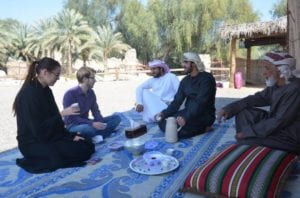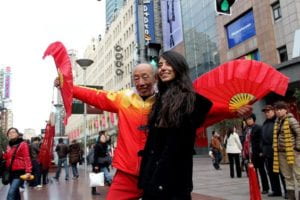 NYU’s global presence is an important part of what distinguishes the university. And study away is an integral experience for students from NYU Shanghai and NYU Abu Dhabi.. Here, three NYU Shanghai juniors share their study away stories from Buenos Aires to Berlin.
NYU’s global presence is an important part of what distinguishes the university. And study away is an integral experience for students from NYU Shanghai and NYU Abu Dhabi.. Here, three NYU Shanghai juniors share their study away stories from Buenos Aires to Berlin.
Global China Studies Major
Study Away Sites: NYU Madrid and NYU Buenos Aires
Enlightenment is a funny thing. You never know when it’s going to hit you. For Lizzy LeClaire, the moment of truth came when she found herself the only non-Chinese person in her Shanghai yoga class. The teacher was giving instructions in Mandarin and Lizzy, who was born and raised in Boston, understood what she was saying. “I’d been practicing my Mandarin, but this was a real litmus test,” says Lizzy, who is majoring in Global China Studies in order to gain an understanding of the country’s educational system. “For the first time, even as I was twisted into a pretzel, I felt accomplished and ready to go beyond the classroom.”
What Lizzy did with her new fluency was travel to a rural village in the Fujian Province to observe a small primary school. “Because many people in China are leaving the villages for the cities in search of work, small schools are being shut down due to declining enrollment. I wanted to see how this trend affected the teachers and students,” she says.
Education is highly valued in China, and although a school may have just a few students and maybe one teacher, there is still a strong desire to keep going. “I saw with my own eyes the excitement in the children’s eyes as they were being taught, and it made me realize that no matter where they live or what their parents do, kids want to learn,” says Lizzy. It was then she realized that educational activism, a movement that works to improve educational access for all children worldwide, was what she wanted to concentrate on.
“My time in China was so valuable as far as opening my eyes to the possibilities of advancing education in other rural areas, but I knew, to complete my studies, I would have to see other places,” says Lizzy. One of the countries on her wish list was Spain. “The reason I chose NYU Madrid for my junior year was to gain fluency in Spanish. I figured that by being fluent in three of the most widely spoken languages in the world, I could go wherever I was needed most.” Now in Buenos Aires, Lizzy is perfecting her Spanish. “My favorite part of being in Argentina is living with a host family and learning what they really value in life. Education is something that is held in high regard here, and it’s reaffirmed my commitment to improving educational opportunities in different parts of the world.”
Global China Studies Major
Study Away Site: NYU Berlin
What Was Your ‘Global Experience’ Like Before Coming To NYU Shanghai?
I’m from The Netherlands, and I’m majoring in Global China Studies with plans to double major in Social Science. I’ve studied in Bosnia and Herzegovina, at UWC — a global NGO that aims to unite people, cultures and nations for sustainable development by education.
Besides studying abroad, I love to travel, hike and camp with my family in many different countries. I’ve hiked in Belgium, Italy, France, Germany, Czech Republic, Bosnia and Herzegovina, China, and also a mountain four hours away from New York City.
Why Did You Choose To Study Away In Berlin? What Was It Like?
It was really a choice between traveling somewhere I hadn’t been before–like Ghana or Buenos Aires–or advancing towards my future. Berlin is a big, alternative center of Europe, a great hub for young people and especially for start-ups. It felt familiar to me; it’s not far from my home, and in fact after spending all of last semester there, I became pretty fluent in German, which is similar to Dutch, my mother tongue. Being back in Europe, I was able to reflect on what I’ve learned from my experiences abroad, and how they are applicable to my own culture.
What Was The Best Thing About Studying Away?
Building connections with a professor who taught a social environmental movement class, and establishing the future possibility of working on projects with him and his company. In general, I value being in a new environment where you can meet and learn from people who have different backgrounds. Regardless if at first it seems irrelevant to your future plans, exposure to other cultures will only benefit how you work in an international environment. My advice is: be amazed every single morning.
And You Had An Internship In New York?
In New York I interned at The Partnership on Sustainable, Low Carbon Transport (SLoCaT) an NGO branch of the United Nations. The organization depended on my note-taking in conferences and I also wrote daily reports for them to assist in how they could inform their partners about our progress and cause. I worked at a climate change conference, did some lobbying, and found it exciting to see how people from multiple nations come together to work on international issues and develop policies.
IMA Major
Study Away Site: NYU Abu Dhabi
Driven by graphic design, IMA major Teng Ma (Martin) ‘18 used his study away semester at NYU Abu Dhabi to join the basketball team, introduce a logo to the sheikh of Abu Dhabi, and contemplate how to open up design jobs in his northeast China hometown.
Why did you choose to study away at NYU Abu Dhabi?
I’m an IMA major who is passionate about technology, graphic design and basketball. The year before my study away, I had visited New York as an actor for the NYU Reality Show, and I wanted to explore Abu Dhabi to complete my travel among the three main global sites. I also had heard many good reviews about the design courses there from friends–plus, I couldn’t resist the fact that they had a state of the art indoor basketball court.
What was it like for you there?
I joined the basketball team–practice was rigorous and as early as 6:30am–I took up boxing and other fitness activities, and made a lot of friends with whom to explore the city. I loved the courses I took; a friend recommended a class called Yes Logo, taught by Goffredo Puccetti. In that course, we designed logos for WWF–the panda logo, as well as a logo for Italy and UAE’s 45 Years Celebration. My logo was picked in the top 3 of all the students’ individual designs. Professor Puccetti taught us through direct experience–from start to end, from brainstorming, using software and creating finished products. We even presented our WWF logo to the sheikh, who was impressed.
Along with design, I took a painting course and a strategic management course out of pure interest. And I believe that studying across disciplines will inform how I approach graphic design in my future plans. Learning about how people succeed and what they do to reach their goals was eye opening for me.
One the best experiences was making new friends in Abu Dhabi who are now visiting me at NYU Shanghai while they study away here for a semester. It’s really cool that our adventures together will continue.
Where are you interning and what will you do in the future?
I am currently interning at Bigger Lab, an educational startup aimed at high schoolers in China and based in Puxi, Shanghai. I am helping them meet their various design and branding needs as well as create a new visual identity. After graduation I will probably work in Shanghai for a while. But, I’m keeping an eye out for opportunities in my hometown, Changchun in Jilin province.
My hometown is far from being a big city like Shanghai. Maybe right now people aren’t paying much money to focus on branding and development of logos, but I want to eventually return and empower people there with the experiences I’ve gained in Shanghai and abroad. I want provide opportunities for other people to learn about and understand brand consulting, especially how having design skills can benefit their endeavors.



















